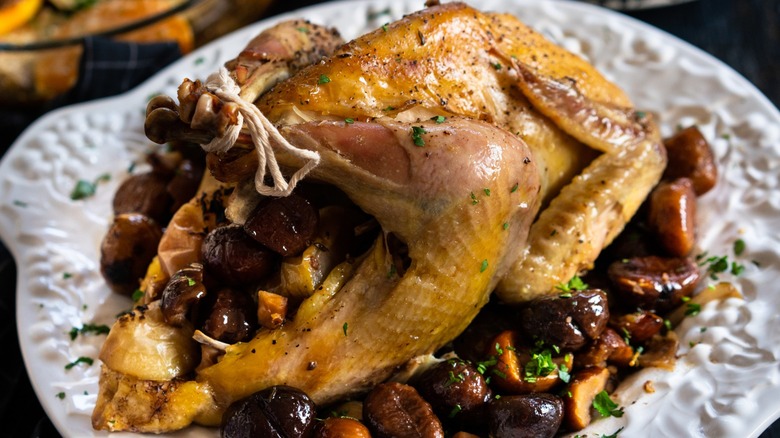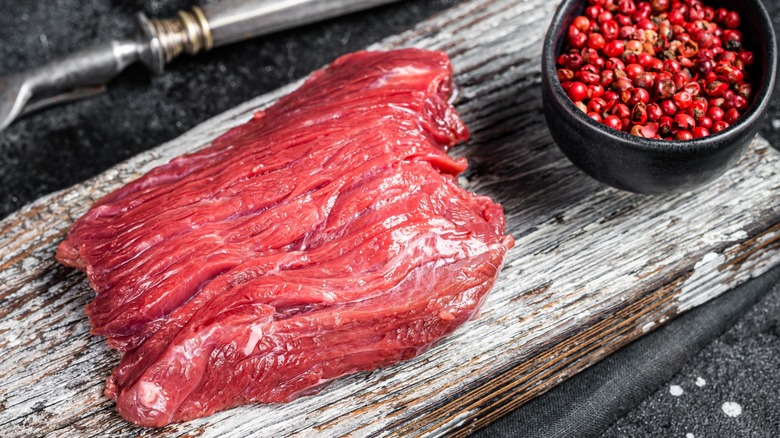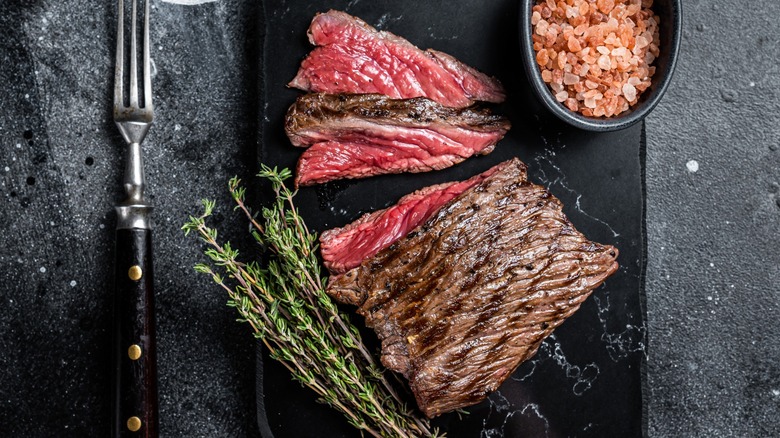What Does It Mean When We Call Meat Gamey?
There are a lot of descriptors you might hear used to refer to meat: savory, umami, smoky, well-aged, etc. But one you've definitely heard before, but might not know what it means, is "gamey." Where does that designation even come from? In the simplest possible terms, "game meat" is meat from game animals. This includes those hunted for sport, such as deer, pheasant (which may be the best game meat to try if you've never had any before), pronghorn, elk — you can even eat squirrel meat (and yes, it's safe). But "gamey" is a taste descriptor rather than one that describes origin (farm-raised lamb often gets hit with this term, too). So, what does it describe?
It turns out, there's no simple, easy-to-digest answer to this question. Ultimately, "gamey" is used as a catch-all term for meat that has a quality that sets it apart from the store-bought meat we're often more used to. Different people are going to have different definitions of the term, though many of them come back to something on the theme of "strong" and "wild." When described positively, this has to do with an animal's level of diet and exercise, and it's perfectly safe — but when used as a pejorative, it often has to do with meat that hasn't been properly treated and has gone bad as a result.
Gamey flavor comes from diet and lifestyle
It's worth noting that farm-raised animals like cattle are primarily fed with corn, and in significant amounts. This has two key effects. First, as an animal's diet significantly influences how it tastes, it lends the mild, mass-appealing flavor of corn to the meat itself. If two animals of the same species are fed with completely different diets, they'll taste noticeably different. This is part of the reason why lamb is often regarded as the "gamiest" of farmed meats: Lamb is usually fed on grass rather than corn, so it tastes different to us (although there are also ways to balance out the gamey taste of lamb).
Second, this controlled corn diet also fattens livestock up far more than you'd get with a wild animal that has to search and scrap for its food to survive, leaving it more likely to possess greater quantities of lean muscle compared to fat. This lean muscle means blood flows through the animal at much more vigorous rates than it does in more sedentary livestock raised in a controlled environment.
When these two factors combine, you get the term "gamey." Those who enjoy it would describe it as a very bold, somewhat metallic flavor due to the increased iron content in wild animals from all that blood circulation. Unfortunately, for many, the word "gamey" does tend to have negative connotations, which is why restaurants often avoid using the term as a descriptor.
Sometimes gamey can also mean spoiled
Those negative connotations aren't always necessarily misplaced — what some would call "gamey" can actually mean wild-caught meat that has spoiled. This definition is very different than the strong, metallic, somewhat wild flavor other people would describe as "gamey" (see how it gets confusing?). This description typically means meat that tastes sour, pungent, and off in a way that is clearly less than ideal. This particular flavor issue often stems from a flawed preparation method.
It's possible that the term "gamey" originated to describe meat that was slightly past its prime, which could explain why a lot of people have an aversion to the idea. Unfortunately, it's sometimes also an issue today, even with freshly-caught game, if the catch is not properly stored. Meat from pronghorn or waterfowl tends to retain heat, meaning if you don't process and cool them down quickly after a kill, the meat is more likely to spoil. This is the downside of "gamey," and unlike the other definition, it's one you want to avoid. Still, according to one of our surveys, Daily Meal readers are curious to try wild game — specifically, the meat of boar and deer.


